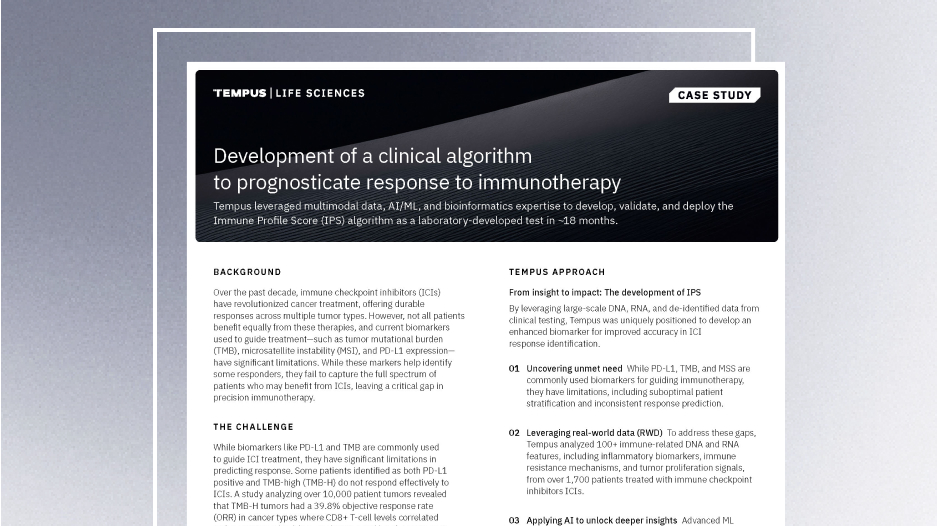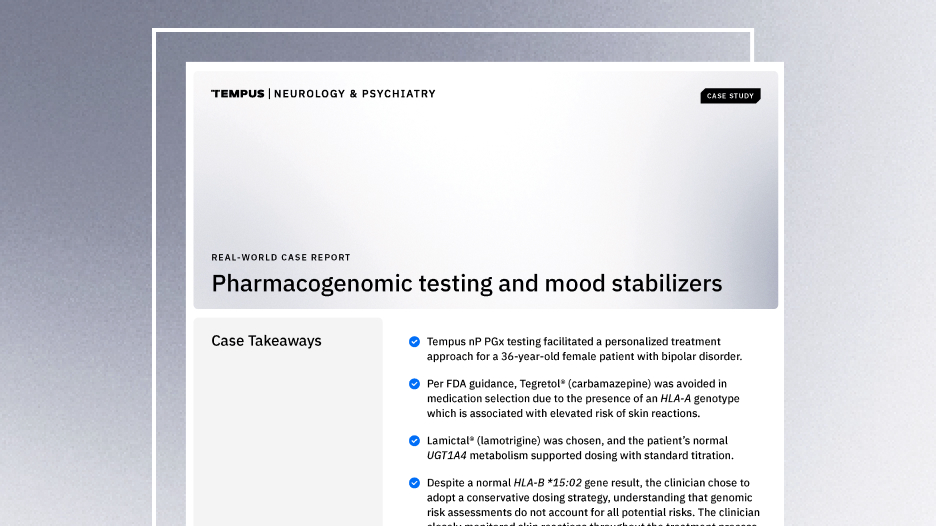-
PROVIDERS
Register now
Are you getting the full picture? A webinar series on the power of comprehensive intelligent diagnostics
-
LIFE SCIENCES
Enroll now
Tempus’ Patient-Derived Organoid ScreensEvaluate the efficacy of your preclinical compounds using fixed organoid panels designed for diverse therapeutic applications. Space is limited — enroll by June 30, 2025, to secure your spot.
-
PATIENTS
It's About Time
View the Tempus vision.
- RESOURCES
-
ABOUT US
View Job Postings
We’re looking for people who can change the world.
- INVESTORS
06/15/2022
My takeaways: “Advancing equitable cancer care through innovation” at the 2022 ASCO Annual Meeting
Authors
James Chen, MD, Senior Vice President, Cancer Informatics
After a long two years, I found it comforting, even nostalgic, to return to Chicago’s McCormick Place for the first in-person ASCO since 2019. ASCO is one of the most important conferences for presenting the latest, most practice-changing research in cancer care. And this year did not disappoint.
The theme of this year’s program was Advancing Equitable Cancer Care Through Innovation, which I found especially salient to our core mission at Tempus, as our medical and scientific community continues to advance health equity. As the meeting theme suggests, innovative approaches are necessary to battle cancer, provide equitable care, and increase access to potentially life-saving therapies and clinical trials.
From my vantage point as both a medical oncologist and translational bioinformatician at Tempus, I am proud of our achievements in precision medicine. Tempus’ intelligent diagnostics will help individual physicians understand which patients to test, when to test, and what the test results mean. Working hand-in-hand with our providers, we are making accessible precision medicine solutions for our patients wherever they are. Ultimately, equitable care and increased access to genomic testing and targeted, therapeutic options means greater representation and diversity in cancer research, which can help even more patients over time.
A few core themes emerged during this ASCO, such as MRD, or minimal residual disease. MRD represents a small number of cancer cells left in the body after treatment that are not detectable by imaging or traditional blood tests. These cells have the potential to come back and cause cancer relapse in our patients. MRD will likely be the next paradigm shift in cancer testing and informing therapeutic management strategies. As we plan to introduce our own MRD test, I look forward to witnessing its potential in transforming patient care.
And certainly, what was old is new and exciting again. Akin to understanding our ability to retarget the androgen receptor in prostate cancer, results from the DESTINY-Breast04 study has opened up medications for an entire class of HER2+ (ERBB2) patients in an ingenious HER2-low strategy. This was presented at the plenary session and the crowd gave the presenter a standing ovation.
Friends and colleagues – Although ASCO had been on hiatus, there is no doubt that science never went on quarantine. Results of the DESTINY study and some other impactful studies are summarized below. All these incredible breakthroughs will certainly continue to fuel our innovative work here at Tempus. I am looking forward to seeing what will come up next!
Plenary Session
- Trastuzumab deruxtecan (T-DXd) versus treatment of physician’s choice (TPC) in patients (pts) with HER2-low unresectable and/or metastatic breast cancer (mBC): Results of DESTINY-Breast04, a randomized, phase 3 study. Presented by Shanu Modi, MD (Memorial Sloan Kettering Cancer Center)
- The readout of Destiny-Breast 04 will change the treatment paradigm for mBC. Based on the results, the treatment paradigm must now consider a new definition of HER2 positive including HER2-low (defined as IHC 1+ or IHC 2+/ISH-). Previous anti-HER2 agents have not had successful efficacy in this sub-group, but is now targetable by newer generations of anti-HER2 ADCs.
- T-DXd is the first HER2 targeted therapy to demonstrate efficacy in HER2-low mBC and establishes T-DXd as the new SOC for HER2-low mBC and has the potential improvement of 50% of all mBC today
- The trial met its primary and secondary endpoints.
- In patients with HR+ mPFS of 10.1 months with T-DXd compared to 5.4 months with the comparator arm, and OS of 23.9 months in T-DXd compared to 17.5 months in comparator arm
- Results were almost identical in the entire population which included ~60 HR- (TNBC patients)
- In patients with TNBC mPFS of 8.5 months with T-DXd compared to 2.9 months with the comparator arm, and OS of 18.2 months in T-DXd compared to 8.3 months in comparator arm, doubling OS for this patient population with extremely high unmet need.
Oral Abstract Session: Lung Cancer—Non-Small Cell Metastatic
- Pros and cons of chemoimmunotherapy combinations in first-line (1L) advanced NSCLC:
- In an exploratory retrospective pooled analysis by the FDA there was no statistical difference in OS between chemo-IO versus IO alone for NSCLC patients with PD-L1 ≥50%; however, PFS was statistically significant in favor of chemo-IO compared to IO alone. The results support shared decision making with patients.
- Patients >75 years old receiving chemo-IO may not have better outcomes over IO alone.
- Based on a pooled analysis, NSCLC patients with KRAS mutations benefit from 1L chemoimmunotherapy similarly to those with wild-type KRAS and should receive combination therapy upfront.
- The results of the study were questioned in discussion due to a potentially biased population.
- In an exploratory retrospective pooled analysis by the FDA there was no statistical difference in OS between chemo-IO versus IO alone for NSCLC patients with PD-L1 ≥50%; however, PFS was statistically significant in favor of chemo-IO compared to IO alone. The results support shared decision making with patients.
- Updated results from KRYSTAL-1 Ph II (n=116) show adagrasib (a KRAS G12C inhibitor) is well tolerated and demonstrates promising efficacy (ORR of 43% ORR and 1-year survival of 51%) in chemoimmunotherapy pretreated patients with NSCLC harboring thismutation.
- When compared to the sotorasib registrational cohort, adagrasib activity and safety is overall similar.
- Amivantamab (EGFR-MET bispecific antibody) showed efficacy in EGFRm NSCLC after progression on osimertinib and platinum-based chemotherapy (CHRYSALIS-2) and in primary METex14 NSCLC including after prior MET inhibitor treatment.
- Phase 1/2a study of CLN-081 (pan-mutant EGFR) in patients with NSCLC with EGFR exon 20 insertion mutations showed a manageable safety profile, with anti-tumor activity across the range of doses tested.
Clinical Science Symposium: Gastrointestinal Cancer—Gastroesophageal, Pancreatic, and Hepatobiliary
- Session showcased the promise of precision medicine in intrahepatic cholangiocarcinoma.
- Final analysis of FOENIX-CCA2, pivotal Ph II non-randomized of futibatinib (irreversible FGFR1-4 inhibitor) in intrahepatic cholangiocarcinoma harboring FGFR2 fusions/rearrangements confirms the durable efficacy (ORR of 42%, mPFS of 8.9 months, OS of 20 months) and tolerability, far exceeding standard of care.
- Patients still progress within one year and better biomarkers are needed to predict sensitivity and resistance.
- Exploratory ctDNA analysis of FGFR2 fusion/rearrangement had a percent positive agreement (PPA) of 87% between tissue-based analyses and ctDNA, indicating ctDNA profiling can be used in cholangiocarcinoma.
- Final analysis of FOENIX-CCA2, pivotal Ph II non-randomized of futibatinib (irreversible FGFR1-4 inhibitor) in intrahepatic cholangiocarcinoma harboring FGFR2 fusions/rearrangements confirms the durable efficacy (ORR of 42%, mPFS of 8.9 months, OS of 20 months) and tolerability, far exceeding standard of care.
- Improving pancreatic cancer outcomes may be possible with identifying actionable molecular alterations.
- A multi-omics panel showed novel biomarkers are associated with OS improvement in first line chemoimmunotherapy in mPDAC.
- Study suggests possibility to enrich patient populations based on survival prediction from circulating and tumoral biomarkers.
- Discussant made clear OS prediction is quite complicated but the results prove biomarker OS prediction warrants further investigation.
- Data suggests targeting the MAPK pathway in pancreatic cancer, which is further strengthened by the NOTABLE trial.
- NOTABLE a Ph III study of nimotuzumab (anti-EGFR) combined with gemcitabine in patients with KRAS wild-type PDAC showed increased OS (10.9 months vs. 8.5 months) and PFS, particularly for those without treatment of biliary obstruction.
- A multi-omics panel showed novel biomarkers are associated with OS improvement in first line chemoimmunotherapy in mPDAC.
-
04/02/2025
Development of a clinical algorithm to prognosticate response to immunotherapy
Discover how Tempus developed and deployed the Immune Profile Score (IPS)—a powerful algorithm that provides prognostic insights into patient outcomes following treatment with immune checkpoint inhibitors (ICIs)—in ~18 months. This case study highlights the AI-driven methodology, real-world validation, and the impact of IPS in precision oncology.
Read more -
03/25/2025
AI & ML in action: Unlocking RWD with GenAI through Tempus Lens
Discover how Tempus is equipping researchers with innovative AI solutions to fully leverage the potential of multimodal data. Gain insights from a panel of leaders across healthcare and life sciences as they discuss the impact of these advanced tools on delivering insights with speed.
Watch replay
Secure your recording now. -
03/11/2025
Case Report: Pharmacogenomic testing and mood stabilizers
This real-world case demonstrates how the Tempus nP pharmacogenomic test facilitated a personalized treatment approach for a patient with bipolar disorder.
Read more


